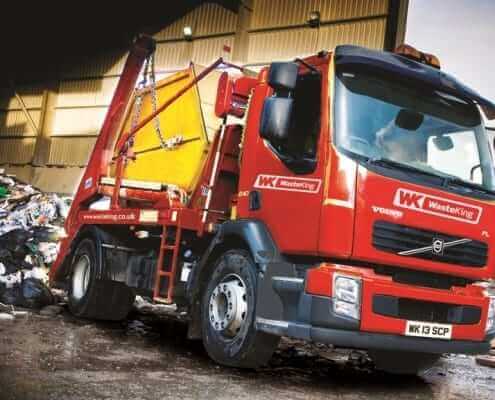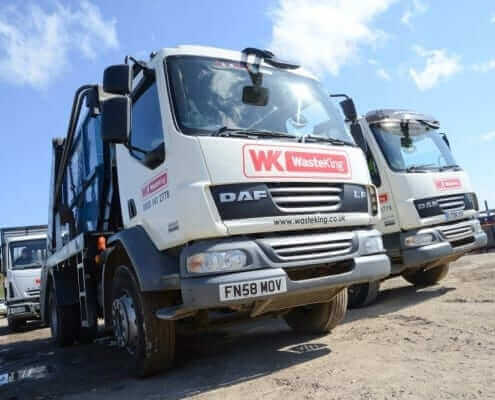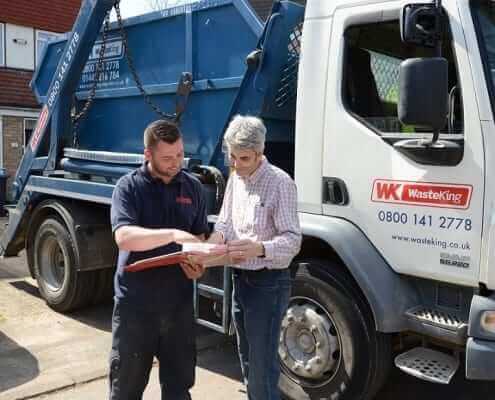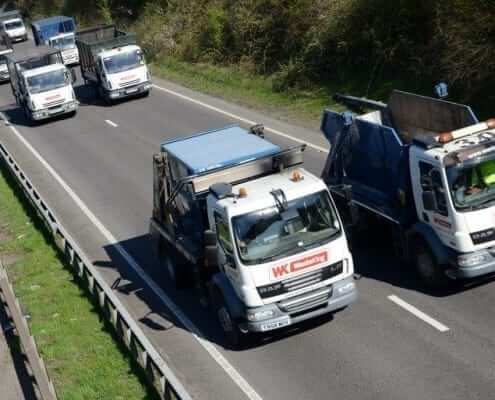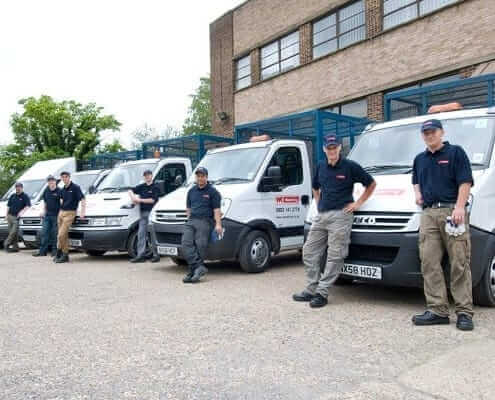Welcome, fellow builders, to the ultimate guide on managing construction waste! If you’re in the construction industry, you know that handling waste efficiently and responsibly is more than just a task – it’s a necessity. In this in-depth guide, we’ll explore various waste removal options, their advantages and disadvantages, and provide you with a comprehensive summary before delving into the details. So, grab your hard hat, because we’re about to dig deep into the world of construction waste management!
The Challenge of Construction Waste
Construction projects, big or small, generate an incredible amount of waste. Proper waste management isn’t just about complying with regulations; it’s about being stewards of our environment and resources. Let’s explore the main waste removal options and their nuances in detail.
Skip Hire: Streamlined Waste Removal
Skip hire provides a convenient and versatile solution for waste removal. It reduces the need for on-site storage, offers quick pickups and deliveries, and is cost-effective for medium to large projects.
Pros:
- Convenient and versatile: Skip hire is a versatile waste removal option suitable for various types of waste materials. It provides an easy and efficient way to dispose of construction debris.
- Reduces on-site storage: One of the significant advantages of skip hire is that it reduces the need for on-site storage of waste, keeping your construction site organised and safe.
- Quick and easy pickup and delivery: Skip hire companies usually offer prompt delivery and pickup services, allowing you to focus on your construction project without unnecessary delays.
- Cost-effective for medium to large projects: Skip hire can be cost-effective for projects with a steady stream of waste, making it suitable for medium to large construction jobs.
Cons:
- Limited capacity: Choosing the right skip size is crucial, as they come in various capacities. Smaller skips may fill up quickly, while larger ones may take up too much space.
- Not ideal for hazardous waste: Skip hire is not suitable for hazardous materials like asbestos, chemicals, or contaminated soil, which require specialised disposal methods.
- Requires designated placement area: You’ll need a designated area for placing the skip, which might not always be possible on certain construction sites.
- Potential for damage: If not placed correctly, skips can damage driveways, pavements, or landscaping, leading to additional costs.
When to Use:
- Skip hire is perfect for construction sites with a steady stream of waste and a predictable waste generation rate.
- It’s ideal for renovations, demolitions, or construction projects where you need to dispose of non-hazardous materials like wood, metal, concrete, and general construction debris.
Roll-on Roll-off RORO Skips: Handling Large Volumes with Ease
Roll-on Roll-off skips offer large capacity options, versatility for various waste types, and are suitable for larger construction projects.
Pros:
- Large capacity options available: RORO skips come in various sizes, making them suitable for handling large volumes of construction waste efficiently.
- Versatile for various waste types: These skips are versatile and can accommodate a wide range of waste materials, including heavy and bulky items.
- Easy to load: RoRo Skips often have a rear door, making it easier to load heavy or awkwardly shaped materials.
- Suitable for larger construction projects: If you’re working on a large-scale construction or demolition project, RoRo skips are a practical choice.
- Regular pickup and replacement service: Many waste management companies offer regular pickup and replacement services, ensuring that you always have an empty dumpster ready when you need it.
Cons:
- Requires ample space: RoRo Skips take up significant space, which may not be feasible on smaller construction sites or sites with limited space availability.
- Not always suitable for small sites: On smaller sites,RoRo skips might be overkill, leading to unnecessary costs.
- Limited mobility once placed: Once placed, RoRo skips are not easily moved, so careful planning is necessary.
- Can be more expensive: RoRo skips can be more expensive than other waste removal options, especially for smaller projects.
When to Use:
- Opt for RoRo skips when you have a high volume of waste to dispose of, making them ideal for large-scale construction or demolition projects.
- They work well for mixed waste types but are not suitable for hazardous materials.
Waste Collection Bags: Compact and Portable
Waste collection bags are highly portable, space-saving, and suitable for smaller projects.
Pros:
- Highly portable and space-saving: Waste collection bags are compact and portable, making them ideal for smaller projects with limited space.
- No need for designated placement areas: Unlike skips or roll-off dumpsters, waste collection bags don’t require a designated placement area, giving you flexibility.
- Can be used for mixed waste types: These bags can handle various waste types, including general construction debris.
Cons:
- Limited capacity: Waste collection bags have a limited capacity compared to skips or dumpsters, so frequent replacements may be necessary for larger projects.
- May not be as durable: Depending on the quality, some bags may not be as durable as skips or roll-off dumpsters, potentially leading to tears or leaks.
- Not suitable for heavy or sharp materials: They may not be suitable for heavy materials or sharp objects that could puncture the bag.
When to Use:
- Waste collection bags are great for smaller projects with limited space, such as DIY home renovations.
- Use them for disposing of general construction waste and non-hazardous materials.
Junk Removal Services: Hassle-Free Waste Removal
Pros:
- Hands-off waste removal: Man and Van rubbish removal services take care of everything, from loading to disposal, providing a hassle-free waste removal solution.
- No need for on-site equipment: You won’t need on-site equipment like skips or dumpsters, making it suitable for sites with space constraints.
- Suitable for any waste type: Junk removal services can handle a wide range of waste types, including bulky items and hard-to-handle waste.
- Often includes labor for loading: Many junk removal services include labor for loading, saving you time and effort.
Cons:
- Can be more expensive: Junk removal services can be pricier than other options due to the convenience they offer.
- Limited to specific pickup schedules: You’ll need to schedule pickups in advance, which may not be suitable for projects with rapidly changing waste generation rates.
- May not be suitable for ongoing projects: Junk removal services are best suited for one-time cleanups or smaller-scale projects.
When to Use:
- Consider junk removal services when you want a hassle-free waste removal solution and don’t want to deal with on-site equipment or labor.
- They are ideal for one-time cleanups or small-scale projects, especially when disposing of bulky items or hard-to-handle waste.
Recycling and Reuse: Prioritising Sustainability
Recycling and reuse are environmentally friendly practices that reduce disposal costs, contribute to sustainability goals, and may even lead to tax incentives or rebates.
Pros:
- Environmentally friendly: Recycling and reusing materials reduce the environmental impact of construction projects, contributing to sustainability.
- Reduces disposal costs: Proper recycling can reduce disposal costs and, in some cases, even lead to tax incentives or rebates.
- May lead to tax incentives or rebates: Some regions offer tax incentives or rebates for construction projects that prioritise recycling and reuse.
- Contributes to sustainability goals: Incorporating recycling and reuse practices aligns with sustainability goals and reflects positively on your construction project.
Cons:
- Requires proper sorting and storage: Recycling and reuse require diligent sorting and storage of materials, which can be time-consuming.
- Not all materials are recyclable: Not all construction materials are recyclable, so it’s essential to understand which materials can be recycled and which cannot.
- Initial setup costs: Implementing recycling and reuse practices may require initial setup costs for recycling infrastructure and training.
When to Use:
- Make recycling and reuse a standard practice on all construction sites to reduce the environmental impact.
- Sort materials like wood, metal, cardboard, and plastics for recycling.
- Consider reusing materials like doors, windows, or fixtures when possible, reducing the need for new resources.
Hazardous Waste Disposal: Safety First
Hazardous waste disposal ensures compliance with regulations, reduces environmental risks, prevents legal issues, and protects worker health.
Pros:
- Ensures compliance with regulations: Proper hazardous waste disposal ensures compliance with local and federal regulations, preventing legal issues.
- Reduces environmental risks: Handling hazardous materials with care reduces environmental risks and potential harm to ecosystems.
- Prevents legal issues: Improper disposal of hazardous waste can lead to severe legal consequences, including fines and penalties.
- Protects worker health: Responsible hazardous waste disposal protects the health and safety of workers on construction sites.
Cons:
- Requires specialised handling and storage: Hazardous waste must be handled and stored following strict regulations, which can be challenging and costly.
- Can be expensive: The disposal of hazardous materials can be expensive due to the need for specialised disposal methods and facilities.
- Strict regulations and documentation needed: Complying with hazardous waste disposal regulations involves meticulous record-keeping and documentation.
When to Use:
- Always handle hazardous materials according to local and federal regulations. Failure to do so can result in severe consequences.
- Separate hazardous waste from non-hazardous waste on-site to ensure proper disposal.
- Use specialised disposal services for materials like asbestos, lead-based paint, or chemicals, as they require specific handling and disposal procedures.
Conclusion: Navigating the World of Waste Management
Managing construction waste is a critical aspect of any building project. The right waste removal option depends on your project’s size, the types of materials involved, and your budget. By understanding the pros and cons of each option and knowing when to use them, you can streamline your construction waste management process, reduce costs, and contribute to a greener, more sustainable construction industry.
Whether you’re a seasoned pro or just getting started in the construction business, I hope this guide has provided you with valuable insights into the world of waste management. Remember, responsible waste management not only benefits your bottom line but also the environment and future generations. So, keep it clean, folks, and let’s build a better world, one construction project at a time!


